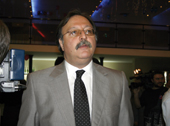Georgia welcomes EU investigation
By Temuri Kiguradze
Tuesday, December 16

Talking with Georgian journalists on December 15, Vashadze stated that “The President [Mikheil Saakashvili] has made it clear that he is ready for cooperation with the Commission, because we are in the right, we have nothing to hide; we have become the victims of Russia’s aggression.” This statement was made the day before the impending visit of Swiss diplomat Heidi Tagliavini, the head of the EU Commission, to Tbilisi, but Vashadze stated that “no concrete discussion” of the matter would take place at this meeting and the Swiss diplomat’s planned visit was a preparatory one.
The EU officially launched its “fact-finding mission” to look into the “origins and the cause of the conflict” after EU Finance Ministers formally endorsed the mission on December 2. According to the text approved by the EU Ministers “the geographical and time limits will be sufficiently broad to determine the possible causes.” The EU has announced it will provide EUR 1.6 million to the mission.
Before her visit Heidi Tagliavini met with Grigory Karasin, the Russian Deputy Foreign Minister, on December 9. “During the conversation the upcoming work of the Commission [studying the war] was discussed,” the Russian Foreign Ministry said in a press release. The importance of elaborating an impartial position about the causes of what happened [in August] and the exact sequence of events, starting from the early [19]90s was noted,” it said. The Russian Foreign Ministry also said that during the meeting the Russian diplomat laid out Moscow’s views on the reasons for the August events and its version of timeline ahead of the war.
The EU mission has to present its conclusions to the EU, OSCE, Georgia and Russia on July 31, 2009. However, the mission could be extended if needed, the Georgian media reported.
Meanwhile tensions in the areas bordering breakaway South Ossetia and Abkhazia are still high. The Georgian side has reported the accumulation of a large number of Russian heavy armoured vehicles and troops near Chuburkhinji village in Abkhazia’s Georgian-populated Gali region on December 15. Two days before the Georgian Interior Ministry and EU Monitoring Mission (EUMM) had announced the Russian re-occupation of the Georgian village of Perevi located on the Georgian side of the South Ossetian administrative border. Tbilisi maintains that the Perevi incident will be one of the issues discussed at the next round of talks in Geneva on December 17-18. Moscow is also preparing for the Geneva discussions and states that the main questions on the agenda will be the “protection of security” in the region and agreements on the return of refugees to the conflict zones. One of the important components of “security protection,” from the Russian point of view, will be an “international embargo on the export of weapons to Georgia.”
The Georgian Foreign Ministry has made a statement concerning the Perevi incident, saying that “The return of the Russian troops to the village of Perevi is especially worrisome against the background of the recent statement by the European Union, which welcomed the dismantling of the Perevi checkpoint. By now it is obvious that the Russian political and military leadership is openly challenging the international community and the authority of the European Union and its monitors, who have been observing the situation in Perevi for last several days. In addition to this, the Russian side is apparently attempting to undermine the Geneva talks.”
